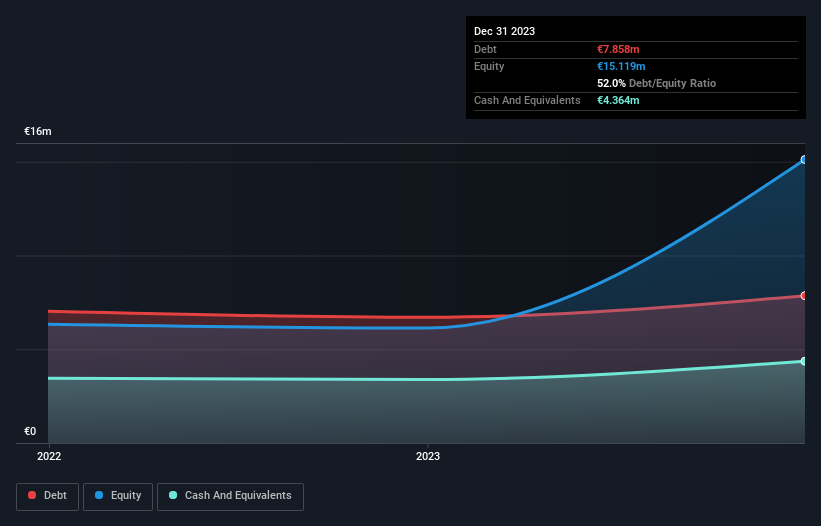Stock Analysis

David Iben put it well when he said, 'Volatility is not a risk we care about. What we care about is avoiding the permanent loss of capital.' It's only natural to consider a company's balance sheet when you examine how risky it is, since debt is often involved when a business collapses. We can see that VNE S.p.A. (BIT:VNE) does use debt in its business. But the more important question is: how much risk is that debt creating?
Why Does Debt Bring Risk?
Debt and other liabilities become risky for a business when it cannot easily fulfill those obligations, either with free cash flow or by raising capital at an attractive price. Part and parcel of capitalism is the process of 'creative destruction' where failed businesses are mercilessly liquidated by their bankers. However, a more common (but still painful) scenario is that it has to raise new equity capital at a low price, thus permanently diluting shareholders. Of course, debt can be an important tool in businesses, particularly capital heavy businesses. The first step when considering a company's debt levels is to consider its cash and debt together.
Check out our latest analysis for VNE
What Is VNE's Debt?
The image below, which you can click on for greater detail, shows that at December 2023 VNE had debt of €7.86m, up from €6.70m in one year. However, it does have €4.36m in cash offsetting this, leading to net debt of about €3.49m.

How Healthy Is VNE's Balance Sheet?
Zooming in on the latest balance sheet data, we can see that VNE had liabilities of €8.71m due within 12 months and liabilities of €5.79m due beyond that. On the other hand, it had cash of €4.36m and €12.3m worth of receivables due within a year. So it actually has €2.12m more liquid assets than total liabilities.
This excess liquidity suggests that VNE is taking a careful approach to debt. Given it has easily adequate short term liquidity, we don't think it will have any issues with its lenders. When analysing debt levels, the balance sheet is the obvious place to start. But it is future earnings, more than anything, that will determine VNE's ability to maintain a healthy balance sheet going forward. So if you want to see what the professionals think, you might find this free report on analyst profit forecasts to be interesting.
In the last year VNE wasn't profitable at an EBIT level, but managed to grow its revenue by 6.2%, to €13m. That rate of growth is a bit slow for our taste, but it takes all types to make a world.
Caveat Emptor
Importantly, VNE had an earnings before interest and tax (EBIT) loss over the last year. Indeed, it lost €420k at the EBIT level. On a more positive note, the company does have liquid assets, so it has a bit of time to improve its operations before the debt becomes an acute problem. Still, we'd be more encouraged to study the business in depth if it already had some free cash flow. So it seems too risky for our taste. When analysing debt levels, the balance sheet is the obvious place to start. But ultimately, every company can contain risks that exist outside of the balance sheet. For example VNE has 2 warning signs (and 1 which is a bit concerning) we think you should know about.
When all is said and done, sometimes its easier to focus on companies that don't even need debt. Readers can access a list of growth stocks with zero net debt 100% free, right now.
Valuation is complex, but we're helping make it simple.
Find out whether VNE is potentially over or undervalued by checking out our comprehensive analysis, which includes fair value estimates, risks and warnings, dividends, insider transactions and financial health.
View the Free AnalysisHave feedback on this article? Concerned about the content? Get in touch with us directly. Alternatively, email editorial-team (at) simplywallst.com.
This article by Simply Wall St is general in nature. We provide commentary based on historical data and analyst forecasts only using an unbiased methodology and our articles are not intended to be financial advice. It does not constitute a recommendation to buy or sell any stock, and does not take account of your objectives, or your financial situation. We aim to bring you long-term focused analysis driven by fundamental data. Note that our analysis may not factor in the latest price-sensitive company announcements or qualitative material. Simply Wall St has no position in any stocks mentioned.
About BIT:VNE
VNE
VNE S.P.A. produces hardware and software for the management of banknotes, coins, and payments and transactions through cash and cashless systems.
Undervalued with high growth potential.

